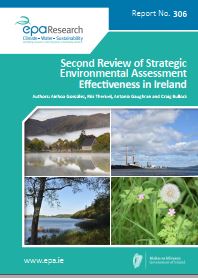Research 306: Second Review of Strategic Environmental Assessment Effectiveness in Ireland
Authors: Ainhoa González, Riki Therivel, Antonia Gaughran and Craig Bullock
Summary: The SEA Directive aims to integrate environmental considerations into planning and decision- making, with a view to promoting sustainable development. However, the extent to which the findings of environmental assessments are informing decisions is not fully understood. This report presents the findings of the second review of Strategic Environmental Assessment (SEA) effectiveness in Ireland.

Identifying Pressures
This review seeks to contribute to and inform Ireland’s response to the requirement of Directive 2001/42/EC on Strategic Environmental Assessment (SEA) for regular review of the effectiveness of SEA implementation in the Member States. The SEA Directive aims to integrate environmental considerations into planning and decision-making, with a view to promoting sustainable development. However, the extent to which the findings of environmental assessments are informing decisions and/or having a positive environmental effect on the ground is not fully understood. In addition, SEA processes have time and financial implications for plan-making authorities and statutory environmental authorities, and there has been concern to justify their effectiveness.
Informing Policy
SEA legal challenges across Europe are indicative of plans/programmes increasingly coming under more scrutiny. In addition, the recent European Commission (EC) Regulatory Fitness and Performance (REFIT) evaluation of the SEA Directive has examined, among other things, the extent to which the Directive’s objectives have been achieved, the resources required to achieve the Directive’s objectives, and its added value. This second review of effectiveness of SEA in Ireland has examined these considerations and identified progress made since the first effectiveness review undertaken in 2012. It has explored progress on how the Directive has been implemented (i.e. procedural effectiveness) and gathered insights from plan-makers and SEA practitioners on less tangible gains, such as improved plans, increased environmental awareness and more proactive environmental integration in subsequent plans and, in turn, projects. The review has also identified costs and benefits of SEA.
These findings have been provided to the Commission for consideration as part of the EC SEA REFIT evaluation and have been shared with the wider international impact assessment community. More importantly, a number of strategic recommendations are put forward, for consideration by the SEA environmental authorities, aimed at fostering ongoing improvement in SEA processes in Ireland and more environmentally sustainable plans/programmes.
Developing Solutions
The review findings recognise that progress has been made, but also identify a number of remaining shortcomings, particularly related to SEA reporting, public engagement and monitoring. A number of recommendations for future initiatives and actions are put forward to help address some of the existing key limitations. In addition, the report includes good practice step-by-step guidance on SEA statements and monitoring. Both the recommendations and the guidance are intended to foster and further good SEA practice in Ireland.
Related Publications
Research 306: Guidance on Strategic Environmental Assessment (SEA) Statements and Monitoring
https://www.epa.ie/media/archive/research/Research_306a_thumbnail.jpg